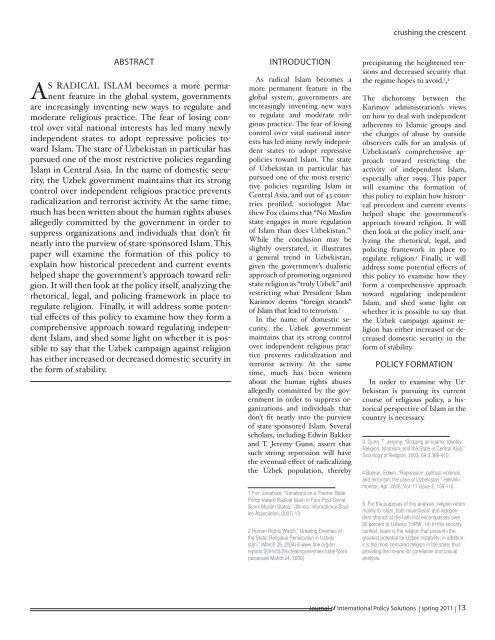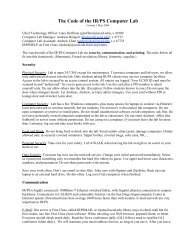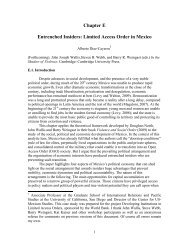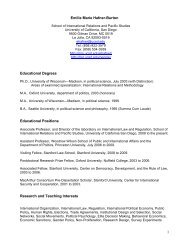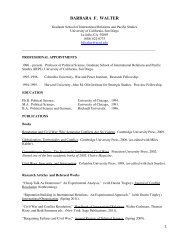to download the full journal. (1.2MB PDF) - School of International ...
to download the full journal. (1.2MB PDF) - School of International ...
to download the full journal. (1.2MB PDF) - School of International ...
You also want an ePaper? Increase the reach of your titles
YUMPU automatically turns print PDFs into web optimized ePapers that Google loves.
crushing <strong>the</strong> crescent<br />
ABSTRACT<br />
AS RADICAL ISLAM becomes a more permanent<br />
feature in <strong>the</strong> global system, governments<br />
are increasingly inventing new ways <strong>to</strong> regulate and<br />
moderate religious practice. The fear <strong>of</strong> losing control<br />
over vital national interests has led many newly<br />
independent states <strong>to</strong> adopt repressive policies <strong>to</strong>ward<br />
Islam. The state <strong>of</strong> Uzbekistan in particular has<br />
pursued one <strong>of</strong> <strong>the</strong> most restrictive policies regarding<br />
Islam in Central Asia. In <strong>the</strong> name <strong>of</strong> domestic security,<br />
<strong>the</strong> Uzbek government maintains that its strong<br />
control over independent religious practice prevents<br />
radicalization and terrorist activity. At <strong>the</strong> same time,<br />
much has been written about <strong>the</strong> human rights abuses<br />
allegedly committed by <strong>the</strong> government in order <strong>to</strong><br />
suppress organizations and individuals that don’t fit<br />
neatly in<strong>to</strong> <strong>the</strong> purview <strong>of</strong> state-sponsored Islam. This<br />
paper will examine <strong>the</strong> formation <strong>of</strong> this policy <strong>to</strong><br />
explain how his<strong>to</strong>rical precedent and current events<br />
helped shape <strong>the</strong> government’s approach <strong>to</strong>ward religion.<br />
It will <strong>the</strong>n look at <strong>the</strong> policy itself, analyzing <strong>the</strong><br />
rhe<strong>to</strong>rical, legal, and policing framework in place <strong>to</strong><br />
regulate religion. Finally, it will address some potential<br />
effects <strong>of</strong> this policy <strong>to</strong> examine how <strong>the</strong>y form a<br />
comprehensive approach <strong>to</strong>ward regulating independent<br />
Islam, and shed some light on whe<strong>the</strong>r it is possible<br />
<strong>to</strong> say that <strong>the</strong> Uzbek campaign against religion<br />
has ei<strong>the</strong>r increased or decreased domestic security in<br />
<strong>the</strong> form <strong>of</strong> stability.<br />
INTRODUCTION<br />
As radical Islam becomes a<br />
more permanent feature in <strong>the</strong><br />
global system, governments are<br />
increasingly inventing new ways<br />
<strong>to</strong> regulate and moderate religious<br />
practice. The fear <strong>of</strong> losing<br />
control over vital national interests<br />
has led many newly independent<br />
states <strong>to</strong> adopt repressive<br />
policies <strong>to</strong>ward Islam. The state<br />
<strong>of</strong> Uzbekistan in particular has<br />
pursued one <strong>of</strong> <strong>the</strong> most restrictive<br />
policies regarding Islam in<br />
Central Asia, and out <strong>of</strong> 43 countries<br />
pr<strong>of</strong>iled, sociologist Mat<strong>the</strong>w<br />
Fox claims that “No Muslim<br />
state engages in more regulation<br />
<strong>of</strong> Islam than does Uzbekistan.” 1<br />
While <strong>the</strong> conclusion may be<br />
slightly overstated, it illustrates<br />
a general trend in Uzbekistan,<br />
given <strong>the</strong> government’s dualistic<br />
approach <strong>of</strong> promoting organized<br />
state religion as “truly Uzbek” and<br />
restricting what President Islam<br />
Karimov deems “foreign strands”<br />
<strong>of</strong> Islam that lead <strong>to</strong> terrorism. 2<br />
In <strong>the</strong> name <strong>of</strong> domestic security,<br />
<strong>the</strong> Uzbek government<br />
maintains that its strong control<br />
over independent religious practice<br />
prevents radicalization and<br />
terrorist activity. At <strong>the</strong> same<br />
time, much has been written<br />
about <strong>the</strong> human rights abuses<br />
allegedly committed by <strong>the</strong> government<br />
in order <strong>to</strong> suppress organizations<br />
and individuals that<br />
don’t fit neatly in<strong>to</strong> <strong>the</strong> purview<br />
<strong>of</strong> state-sponsored Islam. Several<br />
scholars, including Edwin Bakker<br />
and T. Jeremy Gunn, assert that<br />
such strong repression will have<br />
<strong>the</strong> eventual effect <strong>of</strong> radicalizing<br />
<strong>the</strong> Uzbek population, <strong>the</strong>reby<br />
1 Fox, Jonathan, “Variations on a Theme: State<br />
Policy <strong>to</strong>ward Radical Islam in Four Post-Soviet<br />
Sunni Muslim States,” (Illinois: <strong>International</strong> Studies<br />
Association, 2007) 13<br />
2 Human Rights Watch,” Creating Enemies <strong>of</strong><br />
<strong>the</strong> State: Religious Persecution in Uzbekistan.”<br />
(March 29, 2004) 6 www.hrw.org/en/<br />
reports/2004/03/29/creating-enemies-state?print<br />
(accessed March 24, 2009)<br />
precipitating <strong>the</strong> heightened tensions<br />
and decreased security that<br />
<strong>the</strong> regime hopes <strong>to</strong> avoid. 3 , 4<br />
The dicho<strong>to</strong>my between <strong>the</strong><br />
Karimov administration’s views<br />
on how <strong>to</strong> deal with independent<br />
adherents <strong>to</strong> Islamic groups and<br />
<strong>the</strong> charges <strong>of</strong> abuse by outside<br />
observers calls for an analysis <strong>of</strong><br />
Uzbekistan’s comprehensive approach<br />
<strong>to</strong>ward restricting <strong>the</strong><br />
activity <strong>of</strong> independent Islam,<br />
especially after 1999. This paper<br />
will examine <strong>the</strong> formation <strong>of</strong><br />
this policy <strong>to</strong> explain how his<strong>to</strong>rical<br />
precedent and current events<br />
helped shape <strong>the</strong> government’s<br />
approach <strong>to</strong>ward religion. It will<br />
<strong>the</strong>n look at <strong>the</strong> policy itself, analyzing<br />
<strong>the</strong> rhe<strong>to</strong>rical, legal, and<br />
policing framework in place <strong>to</strong><br />
regulate religion. 5 Finally, it will<br />
address some potential effects <strong>of</strong><br />
this policy <strong>to</strong> examine how <strong>the</strong>y<br />
form a comprehensive approach<br />
<strong>to</strong>ward regulating independent<br />
Islam, and shed some light on<br />
whe<strong>the</strong>r it is possible <strong>to</strong> say that<br />
<strong>the</strong> Uzbek campaign against religion<br />
has ei<strong>the</strong>r increased or decreased<br />
domestic security in <strong>the</strong><br />
form <strong>of</strong> stability.<br />
POLICY FORMATION<br />
In order <strong>to</strong> examine why Uzbekistan<br />
is pursuing its current<br />
course <strong>of</strong> religious policy, a his<strong>to</strong>rical<br />
perspective <strong>of</strong> Islam in <strong>the</strong><br />
country is necessary.<br />
3 Gunn, T. Jeremy, “Shaping an Islamic Identity:<br />
Religion, Islamism, and <strong>the</strong> State in Central Asia.”<br />
Sociology <strong>of</strong> Religion, 2003, 64:3 389-410<br />
4 Bakker, Edwin. “Repression, political violence,<br />
and terrorism: <strong>the</strong> case <strong>of</strong> Uzbekistan.” Helsinki<br />
moni<strong>to</strong>r, Apr. 2006, Vol. 17 Issue 2, 108-118<br />
5 For <strong>the</strong> purposes <strong>of</strong> this analysis, religion refers<br />
mainly <strong>to</strong> Islam, both mainstream and independent<br />
strands <strong>of</strong> <strong>the</strong> faith that encompasses over<br />
80 percent <strong>of</strong> Uzbeks. (HRW, 14) In this security<br />
context, Islam is <strong>the</strong> religion that presents <strong>the</strong><br />
greatest potential for Uzbek instability; in addition,<br />
it is <strong>the</strong> most censored religion in <strong>the</strong> state, thus<br />
providing <strong>the</strong> means for correlative and casual<br />
analysis.<br />
Journal <strong>of</strong> <strong>International</strong> Policy Solutions | spring 2011 | 13


